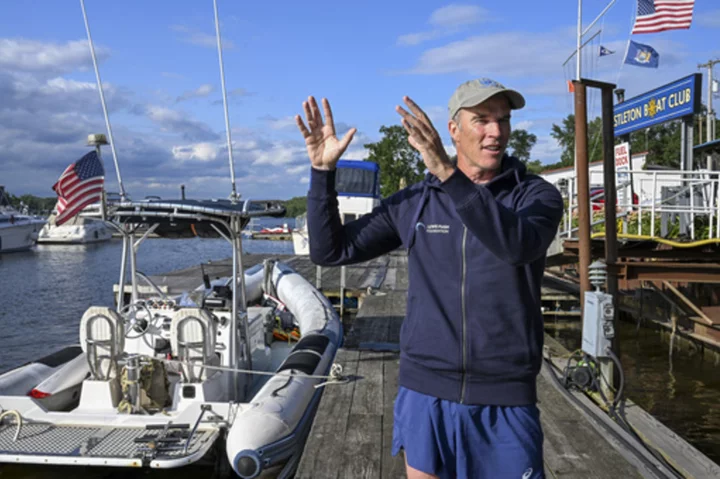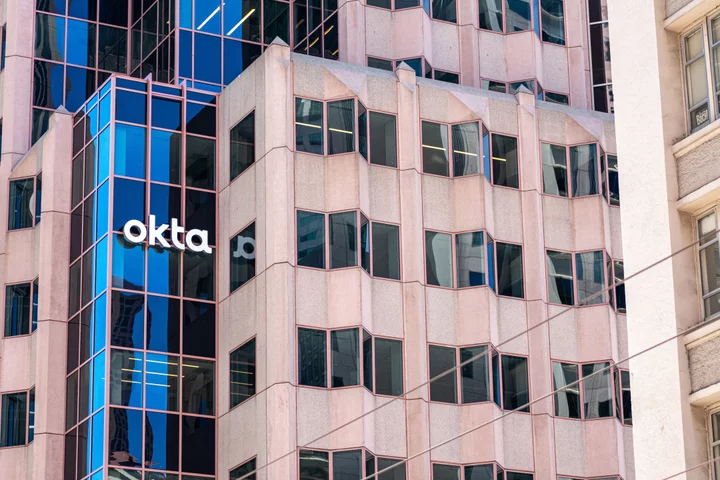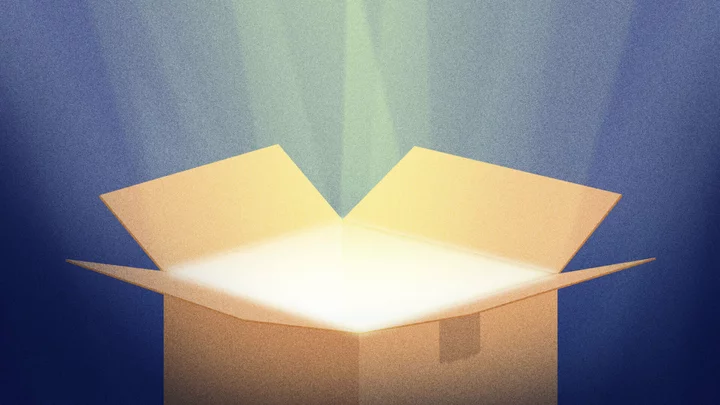Imagine you want to watch some porn. Maybe you even paid for it (good for you). But before you take a squirt from the lube, you have to set up decent lighting in your space, get your driver’s license or passport out, take multiple pictures of the document, take selfies of yourself, then take a selfie of you with the document clearly visible, upload everything to an age verification system, and stay horny long enough to masturbate once you’ve been approved to watch Throbbin’ Hood: Prince of Beaves.
There’s a chance that your state’s capital is one of 18 that want to make that the law of the land — if they haven’t already.
Porn has been under attack in the U.S. before, but state legislatures have made tangible progress this year with sometimes-bipartisan age verification laws requiring adults to submit sensitive information to access content deemed "harmful to minors." Other proposed legislation would require all phones, tablets, and computers be sold with porn-blocking filters unless the purchaser requests their removal, proves they are over the age of 18, and — in some states — pays a fee. Some nationwide bills sponsored by both Democrats and Republicans — such as the EARN IT Act and KOSA — claim they want to protect children at the cost of adults’ rights to a free and open internet.
Want more sex and dating stories in your inbox? Sign up for Mashable's new weekly After Dark newsletter.
Are American lawmakers censoring the internet?
Censoring the internet under the false flag of ‘protecting children’ is nothing new. FOSTA-SESTA claimed it would end child sex trafficking in 2018. The bipartisan law removed section 230 protections from platforms in cases of known sex trafficking. (Section 230 of the 1996 Communications Decency Act protects internet providers from criminal liability for their users' actions.) This began a flurry of weird, panicky updates to social media community guidelines: Instagram almost banned eggplant emojis. Tinder started booting users known (or suspected) to be sex workers. Even the Marriott hotel chain thought it was tackling trafficking by surveilling single women at its bars.
New, intrusive laws recently proposed by 25 states and Congress carry patronizingly wholesome names such as Protect Young Minds Online Act, Kids Online Safety Act, and Protection of Minors from Harmful Material on Internet act. I mean, who would dare vote against protecting minors? (Actually, here’s one list.)
"A lot of [these laws] look common-sense," says Michael Stabile, director of public affairs at the Free Speech Coalition, [something here to explain what FSC does]. "But when you get down to it, the actual effect is going to pressure platforms to disfavor certain types of speech — and certain types of people."
Though lawmakers hope these efforts seem ‘common-sense,’ the courts will have to decide if these alleged no-brainers are constitutional. One judge granted a preliminary injunction (at the eleventh hour) against a Texas law set to go into effect on Sept. 1. The judge — appointed by Ronald Reagan — found House Bill 1181 to be unconstitutional and has blocked all enforcement while the case is being litigated. In addition to age verification requirements, the law would force all websites with adult or sexual content to place inaccurate health warnings on their landing pages — in 14-point font no less. One mandatory warning claims that "pornography increases the demand for prostitution, child exploitation, and child pornography" Another claims that pornography "weakens brain function."
"I got a call earlier this week from a sex education site that was concerned that it was going to fall under these laws, and wanted to know if they should start censoring themselves."There is little-to-no evidence to support the claims in these ‘health warnings.’ It’s mostly just porn panic.
This law would apply not just to sites with hardcore adult content but also to anything the attorney general deems "harmful to minors" (well, acting attorney general since AG Ken Paxton has been suspended since May). The wording of the new law is so vague that, in theory, HB 1181 could be used to require age verification to watch RuPaul’s Drag Race.
SEE ALSO: Why age-verification bills for porn sites won't work"I got a call earlier this week from a sex education site that was concerned that it was going to fall under these laws, and wanted to know if they should start censoring themselves," Stabile told Mashable.
Age Verification Laws
Louisiana led the way in 2022 with a law requiring any commercial website featuring a "substantial" amount of content "harmful to minors" to require age verification for IP addresses in the state. Earlier this year, Mashable's senior editor Stan Schroeder explained the concerns and effects of age verification systems. Under the new law — which went into effect this year — if someone under the age of 18 were able to access this content, their parents could sue the site for psychological harm and attorney fees. Seventeen states have proposed their own HB 142 copycats, and the censorship strategy has succeeded in seven states.
However, legislators seemed displeased that Louisianians were not taking advantage of this bountiful opportunity. According to Stabile, no one has filed a suit. (Mashable reached out to the AG’s communications office to independently verify but have not heard back.) So, lawmakers passed HB 77 in June allowing the AG to fine violating sites $5,000 per day. Rather than spend the vast amount of money it would take to implement AVS, Since the law took effect, Pornhub says that traffic in the state has dropped 80 percent. Maybe shutting down access to porn for everyone was lawmakers’ goal all along.
The thing about the First Amendment is it not only protects free speech. It also protects your ability to access that speech without an undue burden from the State.Some point out that we have laws requiring you to show an ID to purchase certain items. Stabile pushes back at the difference between the store and the home. "When I go to get a glass of wine or a beer from the fridge, I don’t have to show my ID to anyone." Parents who keep alcohol at the house are expected to keep their kids away from the liquor cart. "In the privacy of our homes…we should also be reasonably expected to put in some barriers to make sure they’re not accessing this type of content."
He says that the best solution for limiting minors’ access to porn is the same solution my mom used to stop me from watching the Playboy Channel or South Park: parental controls. Filters "are more effective," he says. "It doesn’t matter if that kid uses a VPN. It doesn’t matter if they’re at the neighbor’s house on their WiFi." Parental filters are free and easy to set up.
The thing about the First Amendment is it not only protects free speech. It also protects your ability to access that speech without an undue burden from the State.
SEE ALSO: Top 5 NSFW sites to learn what porn didn't teach youOther countries are debating the same issue. The UK government is currently debating its own Online Safety Bill including age verification requirements for "lawful but harmful" speech. In Australia, the government’s eSafety commission announced that it will not force adult websites to use age verification due to concerns about the tech and user privacy. "Each type of age verification or age assurance technology comes with its own privacy, security, effectiveness or implementation issues," the government announced.
Instead, they plan "to educate parents on how to access filtering software and limit children’s access to such material or sites that are not appropriate."
SEE ALSO: What teachers and parents wish they could tell kids about pornMandatory Device Filters
Utah pioneered another strategy to keep their adult citizens — not just children — from accessing pornographic content: parental controls for everyone. HB 72 — signed into law by Governor Spencer Cox in 2021 — requires all devices manufactured, sold, or activated within Utah to come with what is basically a child filter. An adult would be provided a passcode to deactivate or uninstall the filter after providing ID. Imagine asking the Apple Store guy to give you access to Bang Bus.
Instead of parents controlling their child’s device access, every adult in Utah would be parented by the State. The strategy here is to put any barrier between a grown adult and sexual content. "I shouldn’t have to go through a government-approval process to reach content that is legal to me," insists Stabile.
"I shouldn’t have to go through a government-approval process to reach content that is legal to me."New Jersey took Utah’s idea one step further in 2022 when Senators Steven Oroho and Nilsa Cruz-Perez and Assembly members Nancy Munoz, Michele Matsikoudis, and Parker Space proposed a $20 unlock fee to remove the filter from new devices. It never made it to a vote, but Oklahoma proposed a copycat unlock fee bill this year. Bad ideas seem to spread like wildfire.
Luckily, Utah’s law only goes into effect when five other states pass similar device filter legislation. At least 11 states have recently attempted to pass their own versions.
Fair Access to Banking Act
There is some hope in the war against porn though. The Fair Access to Banking Act may actually help the adult industry. Not the only one of its kind, the Fair Access to Banking Act requires that banks make judgements based on individual risk metrics of the applicant, rather than political or ideological reasons.
Adult performers often have their bank accounts shut down when someone at the bank discovers that a client at their branch is actually the double-anal porn star they spanked it to the night before. Even though the Fair Access to Banking Act is a highly partisan Republican bill intended to protect gun manufacturers, sex-related businesses may very well find relief in its mission, and the FSC is encouraging liberal lawmakers to work across the aisle to protect marginalized workers. Stabile shares that "while this bill might not be the solution, it signals that change is possible — if we show up and fight for our rights."
SEE ALSO: How sex workers bank their money, since Mastercard abandoned themA state-by-state breakdown of anti-porn laws
Below is a state-by-state guide to anti-porn bills being attempted or passed. Unless otherwise noted, these were from the 2023 legislative session. Scroll to your state to see if you have a local elected official to call.
For those who have not seen School House Rock in a few decades, here’s a quick refresher. If the bill is enrolled, it means that it passed the state’s senate and house of representative (or general assembly), and was signed into law by the governor. If a bill was defeated in the senate or house/assembly, that means it went to a vote and lost. If a bill died in committee, that means the bill was introduced and possibly read out loud or debated upon, but never received a floor vote. Sometimes a bill passes one chamber but dies through the same process in the other chamber.
Alabama
HB 298 - Mandatory Device Filter - passed House, died in Senate.
HB 441 - Age Verification - introduced but indefinitely postponed.
HB 441 took things a step further by requiring that all sites deemed "harmful to minors" must register with the Consumer Protection Division, pay a one-time registration fee, and then an annual fee to the division. As usual, lawmakers tinker with the mechanisms to claim that the government isn’t restricting protected access to content but rather they’re just placing a large burden on the providers of that content to operate within the state.
Arizona
SB 1503 - Age Verification - passed senate, FAILED in the House.
Arkansas
SB 66 - Age Verification - PASSED INTO LAW
An Arkansas judge recently ruled that "harmful to minors" in another law, Act 372 regarding Arkansas libraries, was too vague. A similar argument could be made for SB 66.
California
AB 1501 - Age Verification - committee hearing canceled.
Florida
SB 472, 1620 - Age Verification - died in committee.
Idaho
SB 1163 - Mandatory Device Filter - FAILED (by one vote).
Iowa
HF 2066 - Mandatory Device Filter - died in committee.
HF 489 - Age Verification - died in committee.
Kansas
SB 160/HB 2301 - Age Verification - died in committee.
Kentucky
HB 476 - Age Verification - died in committee.
Louisiana
HB 142 - Age Verification - PASSED INTO LAW.
HB 77 - Age Verification - PASSED INTO LAW.
Maryland
HB 1082 - Mandatory Device Filter - died in committee.
Minnesota
SF 846 - Mandatory Device Filter - died in committee.
Mississippi
SB 2346 - Age Verification - PASSED INTO LAW.
Missouri
SB 308 - Age Verification - died in committee.
Montana
HB 349 - Mandatory Device Filter - passed House, died in Senate committee.
SB 544 - Age Verification - PASSED, in effect January 1, 2024.
Beginning January 1st, 2024, adults in the state of Montana will need to upload identification to access porn and other sites deemed "harmful to minors."
New Jersey
SB 650/A 2952 (2022 session) - Mandatory Device Filter with Unlock Fee - died in committee.
Oklahoma
HB 1050 - Mandatory Device Filter with Unlock Fee - died in committee.
Oregon
SB 257 - Age Verification - died in committee.
South Carolina
S 0591 - Mandatory Device Filter - died in committee.
H 3424/3426 - Age Verification - died in committee.
One of the last actions on H 3424 was busting a Senator Nutt onto the bill as a sponsor.
South Dakota
SB 192 - Age Verification - passed Senate, died in the House.
Tennessee
SB 0138/HB 0761 - Mandatory Device Filter - died in committee.
Texas
SB 2021 - Age Verification - PASSED Senate out of committee, ran out of time in the House.
SB 417 - Mandatory Device Filter - passed Senate, died in committee in the House.
HB 3585/3570/SB 2164 - Age Verification - died in committee.
HB 1181 - Age Verification with warning labels - PASSED INTO LAW, but temporarily blocked from enforcement.
If this law is upheld by the Court, adults in the state of Texas will need to upload identification to access porn and other sites deemed "harmful to minors." Such sites will also feature suspicious warning labels about porn on the landing pages and footers.
Utah
SB 287 - Age Verification - PASSED INTO LAW.
HB 72 (2021 session) - Mandatory Device Filter - PASSED INTO LAW, but not yet in effect.
People in Utah need to upload identification to access porn and other sites deemed "harmful to minors." Utah’s mandatory device filter law will only go into effect when five other states have passed similar legislation. At the time of this writing, no other state has passed a mandatory device filter law.
Virginia
SB 1515 - Age Verification - PASSED INTO LAW.
Virginia’s age verification law went into effect this past July 1.
West Virginia
HB 3339 - Age Verification - died in committee.
HB 2919 - Sexually Oriented Businesses Registration Act - died in committee.
The Sexually Oriented Businesses Regulation Act is a funny bill to end on. This would have outlawed all sexual business in the state including strip clubs, sex toy stores, porno shops and theaters, and even art studios with nude models — which is, of course, unconstitutional. This bill failed to move before the end of the 2023 legislative session, but it showed conservatives’ cards: They think sex is obscene. Period.
But banning sex toy stores and strip clubs reeks of that Robin Williams Jumanji meme: "What year is it?!"







![CVS July 4th hours: Is CVS open Fourth of July? [Updated July 2023]](/i/en/lifestyle/a9541763-d5f2-089d-d7f5-0af5512d8cc5.webp)

